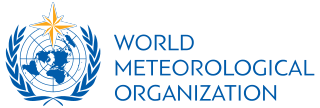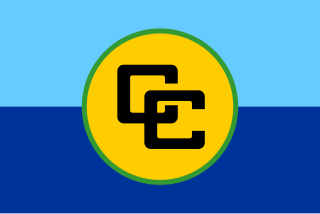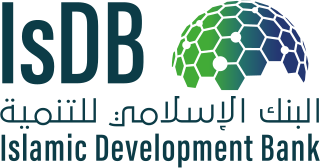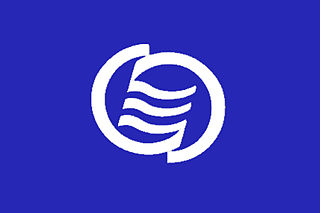
The World Meteorological Organization (WMO) is a specialized agency of the United Nations responsible for promoting international cooperation on atmospheric science, climatology, hydrology and geophysics.

The Caribbean Community is an intergovernmental organisation that is a political and economic union of 15 member states and five associated members throughout the Americas, The Caribbean and Atlantic Ocean. It has the primary objective to promote economic integration and cooperation among its members, ensure that the benefits of integration are equitably shared, and coordinate foreign policy. The organisation was established in 1973, by its four founding members signing the Treaty of Chaguaramas. Its primary activities involve:

The Islamic Development Bank is a multilateral development finance institution that is focused on Islamic finance for infrastructure development and located in Jeddah, Saudi Arabia. There are 57 shareholding member states with the largest single shareholder being Saudi Arabia.

The Organisation of Eastern Caribbean States is an inter-governmental organisation dedicated to economic harmonisation and integration, protection of human and legal rights, and the encouragement of good governance between countries and territories in the Eastern Caribbean. It also performs the role of spreading responsibility and liability in the event of natural disaster.

The Association of Caribbean States is an advisory association of nations centered on the Caribbean Basin. It was formed with the aim of promoting consultation, cooperation, and concerted action among all the countries of the Caribbean coastal area. The 5 main purposes of the ACS is to promote greater trade between the nations, enhance transportation, develop sustainable tourism, facilitate greater and more effective responses to local natural disasters, and to preserve and conserve the Caribbean Sea.
The Caribbean Examinations Council (CXC) is an examination board in the Caribbean. It was established in 1972 under agreement by the participating governments in the Caribbean Community to conduct such examinations as it may think appropriate and award certificates and diplomas on the results of any such examinations so conducted. The council is empowered to regulate the conduct of any such examinations and prescribe the qualification requirements of candidates and the fees payable by them. It is now an examining body that provides educational certifications in 16 English-speaking Commonwealth Caribbean countries and territories and has replaced the General Certificate of Education (GCE) examinations used by England and some other members of the Commonwealth. The CXC is an institution of the Caribbean Community (CARICOM); it was recognised as an Associate Institution of the Community in the 1973 treaty that created the Caribbean Community. Members of the council are drawn from the 16 territories and the region's two universities, the University of Guyana and the University of the West Indies.

The Caribbean Institute for Meteorology and Hydrology was established in 1967 by the member states, all current and ex-British colonies, of the Caribbean Meteorological Organisation (CMO). It was amalgamated with the Caribbean Operational Hydrological Institute (COHI) in the mid-1980s to form the Caribbean Institute for Meteorology and Hydrology (CIMH), but the name was only officially changed in September 1999 to reflect the dual role of the institute. Responsibility for the operation of the institute, which is located in Barbados, rests with the sixteen Commonwealth governments which comprise the CMO.

The Latin American Parliament (Parlatino) is a regional, permanent organization composed by the countries of Latin America and the Caribbean. It is a consultative assembly similar to the early European Parliament. Currently the institution is being considered to become the legislative organ of the Community of Latin American and Caribbean States.
The Treaty of Chaguaramas established the Caribbean Community and Common Market, popularly known as CARICOM. It was signed on 4 July 1973 in Chaguaramas, Trinidad and Tobago. It was signed by Barbados, Guyana, Jamaica, and Trinidad and Tobago. It came into effect on 1 August 1973. The treaty established the regional institution while replacing the Caribbean Free Trade Association which ceased to exist on 1 May 1974. The revised treaty, signed in 2001, created the Caribbean Single Market and Economy.

The Regional Security System (RSS) is an international agreement for the defence and security of the eastern Caribbean region with future expansion planned with South America.

The Caribbean Free Trade Association (CARIFTA) was an English-speaking economic trade organisation. It organised on 1 May 1968, to provide a continued economic linkage between the English-speaking countries of the Caribbean. The agreements establishing it came following the dissolution of the West Indies Federation, which lasted from 1958 to 1962.

The Agence universitaire de la Francophonie is a global network of French-speaking higher-education and research institutions. Founded in Montreal, Quebec, Canada in 1961, as the Association des Universités Partiellement ou Entièrement de Langue Française (AUPELF), the AUF is a multilateral institution supporting co-operation and solidarity among French-speaking universities and institutions. It operates in French-speaking and non-speaking countries of Africa, the Arab world, Southeast Asia, North and South America, Polynesia, the Caribbean, Central, Eastern and Western Europe. As of 2020, the AUF has 1,007 members distributed throughout francophone countries on six continents. It is active in 119 countries, and represented by regional offices and information centers on campuses and in institutes. The Association receives funding from the Organisation internationale de la Francophonie (OIF), and its headquarters are located at the Université de Montréal, Quebec.

The Pakistan Meteorological Department (PMD) (Urdu: محکمہ موسمیات پاکستان, also known as Pakistan Met Office), is an autonomous and independent institution tasked with providing weather forecasts and public warnings concerning weather for protection, safety and general information.
Caribbean Festival of Arts, commonly known as CARIFESTA, is an annual festival for promoting arts of the Caribbean with a different country hosting the event each year. It was started to provide a venue to "depict the life of the people of the Region, their heroes, morals, myths, traditions, beliefs, creativity and ways of expression" by fostering a sense of Caribbean unity, and motivating artists by showing the best of their home country. It began under the auspices of Guyana's then President Forbes Burnham in 1972, who was inspired by other singular arts festivals in the region.

The International Organization of Supreme Audit Institutions (INTOSAI) is an intergovernmental organization whose members are supreme audit institutions. Nearly every supreme audit institution in the world is a member of INTOSAI. Depending on the type of system used in their home country, the members of INTOSAI may be variously titled the Chief Financial Controller, the Office of the Comptroller General, the Office of the Auditor General, the Court of Accounts, or the Board of Audit.
The Caribbean Agricultural Research and Development Institute (CARDI) carries out research and development for agriculture in the Caribbean region. Its headquarters are on the campus of the University of the West Indies (UWI), at St. Augustine in Trinidad and Tobago and it also has national offices throughout the region.
The Caribbean Farmers Network (CaFAN) was formed in 2004 following exploratory discussions amongst farmer organizations in 2002. It is a regional network of Farmers' Associations and Non-governmental organizations in the Caribbean, with its headquarters in Saint Vincent and the Grenadines. Members of CaFAN presently consist of farmer associations from Antigua and Barbuda, Barbados, Bahamas, Belize, Dominica, Grenada, Guyana, Jamaica, St Kitts/Nevis; St Lucia, Saint Vincent and the Grenadines, Trinidad and Tobago and Suriname.
The International Science Council (ISC) is an international non-governmental organization that unites scientific bodies at various levels across the social and natural sciences. The ISC was formed with its inaugural general assembly on 4 July 2018 by the merger of the former International Council for Science (ICSU) and the International Social Science Council (ISSC), making it one of the largest organisations of this type.
Continuously Operating Caribbean GPS Observational Network (COCONet) was a global positioning system (GPS) observation network that spanned across the Caribbean and the neighboring area It was part of UNAVCO (University Navstar Corporation). UNAVCO and IRIS (Incorporated Research Institutions for Seismology) Consortium later merged to create EarthScope Consortium in 2023.











